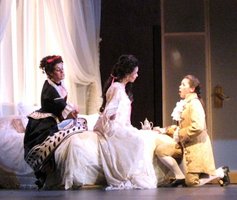
Her name is Tess Altiveros and, in the current UW production of Mozart's Le Nozze di Figaro (jointly staged by the Schools of Music and Drama), she plays the mezzo-soprano "pants role" of the love-struck pageboy, Cherubino. The operatic convention of an adult woman portraying an adolescent male makes musical sense; there's no better practitioner than the beloved Frederica Von Stade, who brings a golden voice and a winsome sprightliness to her art.


Tess Altiveros as girl-crazy Cherubino in the UW's "Marriage of Figaro."
Miss Altiveros enlivens the first half of this Figaro with two brilliant arias about a teenager's hapless, hopeless preoccupation with the opposite sex. First, in "Non so piu" Cherubino explains that he's turned on by every female he sees. Then, in Voi che sapete, he asks the universal question, "What is love?" Miss Altiveros makes the awkward lad's singlemindedness and befuddlement heartbreakingly credible.
She's been studying toward a degree in vocal performance with tenor Vinson Cole; in the meantime, she's sung at Town Hall and is the resident soprano soloist at Trinity Episcopal Church's Cascadian Chorale. Not bad for a singer who's still in college. One to watch.
Two performances to go, Friday night and Sunday afternoon, and do go. The $20 ticket price at Meany is a fraction of what you'd pay at McCaw, provides at least as much pleasure, and does far more to nurture the future of classical opera. More on the production below.
Le Nozze de Figaro, Meany Hall, May 19th & 21st. 206-543-4880
It all starts with Beaumarchais, the French social satirist. His tales of a street-wise barber named Figaro spawned an opera by Rossini, The Barber of Seville (in which Figaro arranges for Count Almaviva to marry Rosina) and another by Mozart, The Marriage of Figaro (in which Almaviva, by now bored with Rosina, lusts for Figaro's fiancee Susanna). The notion that a wily servant like Figaro would challenge his master's authority was considered revolutionary; for a time, French court censors banned performances of the Beaumarchais plays.
Mozart had to tone down the play's incendiary politics (which seem quaint today) in favor of its emotional impact, which puts Countess Almaviva's despair at being neglected by her husband at the heart of the opera. In Cosi Fan Tutte, the men demonstrate that all women are "like that," fickle. In this case, it's the women, the Countess and Susanna, who humiliate the philandering Count before letting him off the hook.
No such forgiveness, the following year, for the title character of Mozart's next opera, Don Giovanni; he gets consumed by the flames of hell. Indeed, within a matter of months, the Bastille was stormed and the French Revolution was underway.
Posted by Ronald Holden at May 18, 2006 5:25 PM

The International Kitchen
Cooking school vacations in Italy, France & Spain.


 Who links to me?
Who links to me?